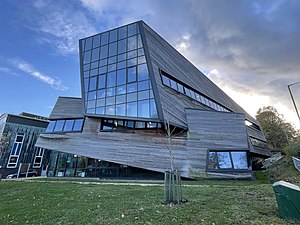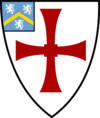Institute for Computational Cosmology
This article has multiple issues. Please help improve it or discuss these issues on the talk page. (Learn how and when to remove these template messages)
|
 | |
| Established | November 2002 |
|---|---|
| Purpose | Cosmology |
| Coordinates | 54°46′01″N 1°34′30″W / 54.76694311327431°N 1.5749791848612393°W |
Director | Shaun Cole |
Parent organization | Durham University |
| Website | icc |
The Institute for Computational Cosmology (ICC) is a research institute
The current director of the ICC is
History
Durham University's extragalactic astronomy group was founded in the late 1970s, and secured in 1984–5 with the appointments of Carlos Frenk, Richard Ellis, and Tom Shanks. A group researching theoretical cosmology grew steadily during the 1980s and 1990s, mainly funded by the UK Particle Physics and Astronomy Research Council (PPARC). A dedicated building for theoretical cosmology was then funded through private donations, principally from alumnus Peter Ogden, and opened in 2002 by the Prime Minister, Tony Blair.[7] The group has grown in these new facilities, and the ICC now hosts more than 60 researchers, including theoretical and observational cosmologists, as well as astroparticle physicists.[8] Although the ICC is strictly speaking a theoretical institute, theory and observations in cosmology are intimately interwoven. Uniquely amongst Durham University's Research Institutes, the ICC and IPPP are structurally integrated within an academic and teaching department, Physics. The physics department as a whole was awarded grade 5A in the 2001 Research Assessment Exercise[9] (RAE) carried out by the UK government, with the international excellence of research in Astronomy and Particle Physics specifically highlighted. The department's research in Space Science and Astrophysics was rated as number one in Europe and fourth in the world by Thomson Reuters from its Essential Science Indicators (1998–2008).[10]
In November 2016, the ICC moved into the brand new Ogden Centre for Fundamental Physics building, designed by
Supercomputer
The ICC's highest resolution simulations of the evolution of the Universe are performed on the Cosmology Machine (COSMA).
Outreach
A founding goal of the ICC is to "stimulate young people to aspire to be the scientists of tomorrow".[14][15] A full-time outreach officer is employed to develop teaching materials that draw upon current research and coordinate a programme of activities in schools across the North East of England. The ICC has been involved in a number of outreach events aimed at communicating science to the general public, notably:
- The ICC's 3D short movie "Cosmic Origins",
- In 2015, the ICC collaborated on The World Machine project, the centrepiece of the 2015 Durham Lumiere festival This was a celebration of cosmology, projected onto the facade of Durham Cathedral.[citation needed]
- In July 2016, the ICC hosted an exhibition titled Galaxy Makers: How to make a galaxy[25] at the Royal Society 2016 Summer Exhibition.
References
- ^ "Durham University Research Institutes". Archived from the original on 16 December 2013. Retrieved 6 September 2013.
- ^ "Institute for Computational Cosmology - Durham University". www.dur.ac.uk. Retrieved 20 November 2020.
- doi:10.1086/163168.
- S2CID 17395956.
- ^ Dodelson, Scott (2003), Review of astro-ph topcites, retrieved 6 September 2013
- ^ a b Listed as 12th overall in the UK, 134th in the world by "Top 500 supercomputer sites". June 2012. Archived from the original on 2 November 2013. Retrieved 6 September 2013.
- ^ Barrat, Peter (18 October 2002). "Prime Minister Tony Blair Opens New Centre for Physics Research". PPARC. Retrieved 6 September 2013.
- ^ ICC Personnel, retrieved 6 September 2013
- ^ "Research Assessment Exercise 2001". Higher Education Funding Council for England. Archived from the original on 3 October 2013. Retrieved 6 September 2013.
- ^ "Institutional rankings in space sciences", Times Higher Education, 28 August 2008, archived from the original on 29 July 2012, retrieved 6 September 2013
- ^ "Institute for Computational Cosmology Durham University - PhD and postgraduate research in astronomy, astrophysics and cosmology". icc.dur.ac.uk.
- ^ Curtis, Sophie (8 May 2013). "Durham University upgrades supercomputer for cosmology research". Techworld. Archived from the original on 21 June 2013. Retrieved 6 September 2013.
- ^ "DiRAC | Science & Technology Facilities Council | STFC". Archived from the original on 20 June 2013. Retrieved 29 August 2013.
- ^ "10 years of science outreach", Dialogue, vol. 23, pp. 10–11, May–June 2012, archived from the original on 15 March 2016, retrieved 6 September 2013
- ^ Edwards, Pete. "From Higgs to Hubble (and some of the stuff in-between)". Archived from the original on 3 August 2013. Retrieved 6 September 2013.
- ^ a b "OurCosmicOrigins". YouTube. Archived from the original on 31 July 2016.
- from the original on 5 January 2015
- ^ "Stereoscopic Displays and Applications, 3D Theater Session". IS&T and SPIE. 2010. Archived from the original on 16 September 2013. Retrieved 6 September 2013.
- ^ "Durham movie leaves Disney standing". Durham Times. Newsquest. 30 January 2010. Archived from the original on 5 January 2015. Retrieved 6 September 2013.
- ^ "Royal Society". Archived from the original on 10 August 2013. Retrieved 28 August 2013.
- ^ "Welcome to See Further: The Festival of Science + Arts - See Further Festival 2010". 11 April 2014. Archived from the original on 11 April 2014.
{{cite web}}: CS1 maint: bot: original URL status unknown (link) - ^ "British Science Festival". Archived from the original on 28 August 2013.
- ^ "National Science and Technology Fair". Archived from the original on 28 August 2013. Retrieved 29 August 2013.
- ^ British Council (14 August 2013). "'Dark matter' holds key to the origins of the universe". Archived from the original on 26 August 2013. Retrieved 6 September 2013.
- ^ "Galaxy Makers | Design your own Universe!". www.galaxymakers.org. Retrieved 26 December 2018.

